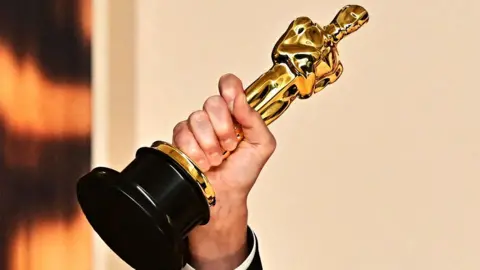In a groundbreaking announcement, the Academy of Motion Picture Arts and Sciences has clarified its stance on the eligibility of films produced with the assistance of artificial intelligence (AI) for prestigious awards such as the Oscars. This significant development indicates a willingness from the Academy to embrace technological advancements while also maintaining a commitment to the traditional essence of filmmaking. According to the new rules issued on a Monday, the Academy stated that the integration of AI and digital tools would “neither help nor harm the chances of achieving a nomination.” This sets a precedent in the competitive film industry, acknowledging the evolving landscape of cinematic creation.
Generative AI, a technology capable of producing text, images, audio, and videos from simple prompts, has already played a role in creating films that received high accolades at industry events, particularly in March of this year. Notably, the Academy will continue to weigh human involvement in the filmmaking process when determining winners. This policy fosters a hybrid approach, merging the ingenuity of human creators with the innovative capabilities of AI.
This new language regarding the eligibility of films produced with generative AI tools follows recommendations from the Academy’s Science and Technology Council. Furthermore, the Academy has also altered its voting rules: members are now required to view all nominated films within their respective categories before participating in the final voting round. Such changes aim to ensure that all members are adequately informed and engaged with the nominated works, further enhancing the integrity of the voting process.
The conversation surrounding AI in filmmaking gained momentum after actor Adrien Brody won the Oscar for Best Actor for his role in the film “The Brutalist.” Remarkably, the film utilized generative AI technology to fine-tune Brody’s Hungarian accent, demonstrating a practical application of AI that could enhance performances in film. Similar voice-cloning technology was noted to have been employed in the Oscar-winning musical “Emilia Perez” to amplify the singing voices of performers, further evidencing the integration of AI in various facets of film production.
However, the infusion of AI in creative processes is not without controversy. Critics, including actors and screenwriters, have voiced concerns about the implications of AI on their careers. During the Hollywood strikes of 2023, many artists expressed fears about job security and the potential for studios to replace human talent with AI applications such as OpenAI’s ChatGPT. Prominent actress Susan Sarandon articulated her apprehensions, stating, “If you can take my face, my body, and my voice and make me say or do something that I had no choice about, that’s not a good thing.” These sentiments highlight the ethical dilemmas posed by AI technologies in the arts.
While some industry professionals have welcomed the advancements AI can offer, notable figures like Scarlett Johansson have cautioned against its potential for misuse, particularly concerning the unauthorized replication of an actor’s likeness. Furthermore, animators have pointed out the limitations of generative AI tools in matching the artistic quality needed for award-winning productions. In a statement, Jonathan Kendrick, co-founder and chairman of the global streaming service Rokit Flix, remarked, “It’s like having a bad writer help you; sure it will get an outline done, but if you need something with emotional weight, an AI isn’t going to get you an Oscar.”
In summary, the Academy’s decision to allow AI-assisted films to compete for Oscars reflects a significant shift in the film industry, recognizing the role of technology in contemporary storytelling. While this opens the door to innovative possibilities, it also raises essential discussions about the implications for artists and their work. The ongoing dialogue between embracing advancements in AI while protecting the integrity and livelihood of human creators will undoubtedly shape the future of the film industry in significant ways. Inside this evolving environment, safeguards surrounding the use of AI have become crucial, as filmmakers, actors, and writers navigate the new landscape of digital creativity.



